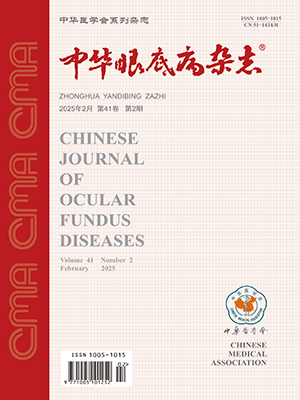| 1. |
Bashinsky AL. Retinopathy of prematurity[J]. N C Med J, 2017, 78(2): 124-128. DOI: 10.18043/ncm.78.2.124.
|
| 2. |
Norman M, Hellström A, Hallberg B, et al. Prevalence of severe visual disability among preterm children with retinopathy of prematurity and association with adherence to best practice guidelines[J/OL]. JAMA Netw Open, 2019, 2(1): e186801[2019-01-04]. https://pubmed.ncbi.nlm.nih.gov/30646195/. DOI: 10.1001/jamanetworkopen.2018.6801.
|
| 3. |
汤加, 陈有信. 血管内皮生长因子的神经保护作用[J]. 中华实验眼科杂志, 2020, 38(1): 64-67. DOI: 10.3760/cma.j.issn.2095-0160.2020.01.013.Tang J, Chen YX. Neuroprotective effect of vascular endothelial growth factor[J]. Chin J Exp Ophthalmol, 2020, 38(1): 64-67. DOI: 10.3760/cma.j.issn.2095-0160.2020.01.013.
|
| 4. |
Shah PK, Prabhu V, Karandikar SS, et al. Retinopathy of prematurity: past, present and future[J]. World J Clin Pediatr, 2016, 5(1): 35-46. DOI: 10.5409/wjcp.v5.i1.35.
|
| 5. |
Lee YS, See LC, Chang SH, et al. Macular structures, optical components, and visual acuity in preschool children after intravitreal bevacizumab or laser treatment[J]. Am J Ophthalmol, 2018, 192: 20-30. DOI: 10.1016/j.ajo.2018.05.002.
|
| 6. |
Mintz-Hittner HA, Kennedy KA, Chuang AZ, et al. Efficacy of intravitreal bevacizumab for stage 3+ retinopathy of prematurity[J]. N Engl J Med, 2011, 364(7): 603-615. DOI: 10.1056/NEJMoa1007374.
|
| 7. |
Vutskits L, Xie Z. Lasting impact of general anaesthesia on the brain: mechanisms and relevance[J]. Nat Rev Neurosci, 2016, 17(11): 705-717. DOI: 10.1038/nrn.2016.128.
|
| 8. |
中华医学会儿科学分会眼科学组. 早产儿视网膜病变治疗规范专家共识[J]. 中华眼底病杂志, 2022, 38(1): 10-13. DOI: 10.3760/cma.j.cn511434-20211119-00647.Ophthalmology Group of Pediatrics Society of Chinese Medical Association. Expert consensus on the treatment of retinopathy of prematurity[J]. Chin J Ocul Fundus Dis, 2022, 38(1): 10-13. DOI: 10.3760/cma.j.cn511434-20211119-00647.
|
| 9. |
Wong RK, Hubschman S, Tsui I. Reactivation of retinopathy of prematurity after ranibizumab treatment[J]. Retina, 2015, 35(4): 675-680. DOI: 10.1097/IAE.0000000000000578.
|
| 10. |
Fleck BW, Reynolds JD, Zhu Q, et al. Time course of retinopathy of prematurity regression and reactivation after treatment with ranibizumab or laser in the RAINBOW trial[J/OL]. Ophthalmol Retina, 2022, 22: S2468-6530(22)00065-3(2022-05-23)[2022-02-22]. https://pubmed.ncbi.nlm.nih.gov/35202890/. DOI: 10.1016/j.oret.2022.02.006. [published online ahead of print].
|
| 11. |
海峡两岸医药卫生交流协会眼科专业委员会小儿视网膜学组, 中华医学会眼科学分会眼底病学组. 早产儿视网膜病变玻璃体腔注射抗血管内皮生长因子药物治疗的专家共识[J]. 中华眼底病杂志, 2021, 37(11): 836-840. DOI: 10.3760/cma.j.cn511434-20210916-00530.Pediatric Retinology Group of Ophthalmology Professional Committee of Cross-Strait Medical and Health Exchange Association, Fundus Disease Group of Chinese Medical Association Ophthalmology Branch. Expert consensus on intravitreal injection of anti-vascular endothelial growth factor drugs for retinopathy of prematurity[J]. Chin J Ocul Fundus Dis, 2021, 37(11): 836-840. DOI: 10.3760/cma.j.cn511434-20210916-00530.
|
| 12. |
Christoforidis JB, Briley K, Binzel K, et al. Systemic biodistribution and intravitreal pharmacokinetic properties of bevacizumab, ranibizumab, and aflibercept in a nonhuman primate model[J]. Invest Ophthalmol Vis Sci, 2017, 58(13): 5636-5645. DOI: 10.1167/iovs.17-22431.
|
| 13. |
Writing Committee for the Pediatric Eye Disease Investigator Group, Hartnett ME, Wallace DK, et al. Plasma levels of bevacizumab and vascular endothelial growth factor after low-dose bevacizumab treatment for retinopathy of prematurity in infants[J]. JAMA Ophthalmol, 2022, 140(4): 337-344. DOI: 10.1001/jamaophthalmol.2022.0030.
|
| 14. |
Huang CY, Lien R, Wang NK, et al. Changes in systemic vascular endothelial growth factor levels after intravitreal injection of aflibercept in infants with retinopathy of prematurity[J]. Graefe's Arch Clin Exp Ophthalmol, 2018, 256(3): 479-487. DOI: 10.1007/s00417-017-3878-4.
|
| 15. |
Morin J, Luu TM, Superstein R, et al. Neurodevelopmental outcomes following bevacizumab injections for retinopathy of prematurity[J/OL]. Pediatrics, 2016, 137(4): e20153218[2016-03-17]. https://pubmed.ncbi.nlm.nih.gov/27244705/. DOI: 10.1542/peds.2015-3218.
|
| 16. |
Arima M, Akiyama M, Fujiwara K, et al. Neurodevelopmental outcomes following intravitreal bevacizumab injection in Japanese preterm infants with type 1 retinopathy of prematurity[J/OL]. PLoS One, 2020, 15(3): e0230678[2020-03-20]. https://pubmed.ncbi.nlm.nih.gov/32196539/. DOI: 10.1371/journal.pone.0230678.
|
| 17. |
Natarajan G, Shankaran S, Nolen TL, et al. Neurodevelopmental outcomes of preterm infants with retinopathy of prematurity by treatment[J/OL]. Pediatrics, 2019, 144(2): e20183537[2019-07-23]. https://pubmed.ncbi.nlm.nih.gov/31337693/. DOI: 10.1542/peds.2018-3537.
|
| 18. |
Fan YY, Huang YS, Huang CY, et al. Neurodevelopmental outcomes after intravitreal bevacizumab therapy for retinopathy of prematurity: a prospective case-control study[J]. Ophthalmology, 2019, 126(11): 1567-1577. DOI: 10.1016/j.ophtha.2019.03.048.
|
| 19. |
Tsai CY, Yeh PT, Tsao PN, et al. Neurodevelopmental outcomes after bevacizumab treatment for retinopathy of prematurity: a meta-analysis[J]. Ophthalmology, 2021, 128(6): 877-888. DOI: 10.1016/j.ophtha.2020.11.012.
|
| 20. |
Zayek M, Parker K, Rydzewska M, et al. Bevacizumab for retinopathy of prematurity: 2-year neurodevelopmental follow-up[J]. Am J Perinatol, 2021, 38(11): 1158-1166. DOI: 10.1055/s-0040-1710556.
|
| 21. |
Chen X, Zhou L, Zhang Q, et al. Serum vascular endothelial growth factor levels before and after intravitreous ranibizumab injection for retinopathy of prematurity[J/OL]. J Ophthalmol, 2019, 2019: 2985161[2019-05-20]. https://pubmed.ncbi.nlm.nih.gov/31236289/. DOI: 10.1155/2019/2985161.
|
| 22. |
Marlow N, Stahl A, Lepore D, et al. 2-year outcomes of ranibizumab versus laser therapy for the treatment of very low birthweight infants with retinopathy of prematurity (RAINBOW extension study): prospective follow-up of an open label, randomised controlled trial[J]. Lancet Child Adolesc Health, 2021, 5(10): 698-707. DOI: 10.1016/S2352-4642(21)00195-4.
|
| 23. |
Lutty GA, McLeod DS, Bhutto I, et al. Effect of VEGF trap on normal retinal vascular development and oxygen-induced retinopathy in the dog[J]. Invest Ophthalmol Vis Sci, 2011, 52(7): 4039-4047. DOI: 10.1167/iovs.10-6798.
|
| 24. |
杨小元, 蔡瑜婷, 李芸. 日本眼科学会《早产儿视网膜病变的抗VEGF疗法临床指南》解读[J]. 中华实验眼科杂志, 2021, 39(11): 1003-1009. DOI: 10.3760/cma.j.cn115989-20210520-00313.Yang XY, Cai YT, Li Y. Interpretation of clinical guideline for anti-vascular endothelial growth factor therapy of retinopathy of prematurity by Japanese ophthalmological society[J]. Chin J Exp Ophthalmol, 2021, 39(11): 1003-1009. DOI: 10.3760/cma.j.cn115989-20210520-00313.
|




